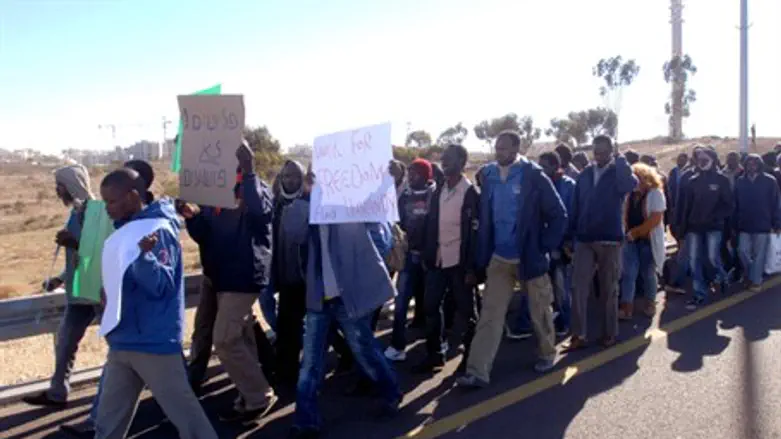
The government approved Sunday a watered-down version of the so-called Infiltrators' Law, which has been disqualified twice by the High Court in previous versions, as disproportionately tough.
The new bill allows authorities to lock up illegal infiltrators for a period of three months in the Saharonim closed facility, and then transfer them to the open Holot facility, where they can be held for up to 20 further months.
The previous version of the law allowed authorities to incarcerate infiltrators for a year without trial, down from three years in the initial version. It was voided by the High Court two months ago, and the government was given 90 days to come up with an alternative version – or shut down the Holot facility altogether and free all its inmates. The state will speed up the process of approving the law, for if it fails, it will have to close down Holot by December 22.
The new law also toughens punishment against employers of infiltrators. These would have to deposit a monthly sum that would come out of the employees' severance pay, but would only be paid to the workers upon their leaving Israel. In addition, the employers would pay higher fines for employing infiltrators, and manpower companies that violate the law will be banned from employing foreign workers for three years.
MK Miri Regev (Likud) called the new version of the law “sterile” and said it was ineffective. “The law opens the door to thousands of infiltrators, work immigrants, to come to Israel and settle here. I intend to bring back changes to the law that will make it effective, so that new infiltrators will be taken into custody for a more meaningful period.”
After a preliminary vote in the Knesset on Monday, the Interior Committee will meet on Tuesday to debate the bill to prepare it for additional Knesset plenum votes.
Illegal immigration - especially from Eritrea and Sudan - is a hotly debated topic in Israel.
The issue is a matter of public perception versus public safety. While proponents of the High Court ruling argue that the detention center is a "human rights" issue, a direct correlation has also been made between infiltration and violent crime.
Residents of south Tel Aviv have been suffering from endless harassment perpetrated by tens of thousands of illegal Eritrean and Sudanese infiltrators who enter Israel to find employment and come to live in their working class neighborhoods. Many Jewish residents say they are terrified of leaving their homes and have begged the government to take action.
What's more, many citizens' rights groups claim the majority of refugees do not qualify as refugees but economic migrants.
While violence has ruled the streets of those neighborhoods for years, controversy was sparked again recently after the High Court’s decision to strike down key sections of the Infiltrators Law, which made it possible to detain illegal immigrants without trial for up to one year.